Celestron AstroMaster 70EQ (90 x 70mm) Telescope$115.00 to $170.00
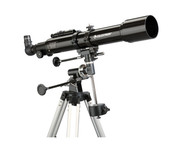
If you're looking for a dual-purpose telescope appropriate for both terrestrial and celestial viewing, then the AstroMaster Series is for you. Each AstroMaster model is capable of giving correct views of land and sky. The AstroMaster Series produce bright, clear images of the Moon and planets. It is easy to see the moons of Jupiter and the rings of Saturn with every one of these fine instruments. For views of the brighter deep space objects like galaxies and nebulae, we recommend the larger aperture and light gathering ability of the Newtonian reflectors.Minimize
Manufacturer:Celestron Product MPN MPN | 21062 | Key Features Optical Design | Refractor | Optical Diameter | 70 mm | Finderscope | Optical | Focal Length | 900 mm | Max Useful Magnification | x 90 | Mount Type | Equatorial | Motorized | No |
Tags:celestron, astromaster, 70eq, 90, x, 70mm, telescope,
| Bushnell NorthStar 78-8831 (525 x 76mm) Telescope$183.00 to $241.00
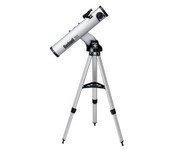
A "talking" high power reflector telescope. Up to 525x magnification and 3-inch reflector mirror. With the touch of a button this talking telescope describes the wonders of the night sky in a real human voice - an interactive and educational way to explore the universe. "Goto" Computerized tracking technology. Red Dot LED finderscope. Remote hand-held control module. Camera adaptable. Quick release tripod. Kinematic mount. Accessory tray. 20,000 Object Onboard Starfinding Computer. 1.25" Format Eyepieces. Barlow Lens. A great starting telescope!Minimize
Manufacturer:Bushnell Product MPN MPN | BUTS788831 | Key Features Optical Design | Newtonians | Optical Diameter | 76 mm | Finderscope | Red-Dot | Focal Length | 700 mm | Max Useful Magnification | x 525 | Mount Type | Altazimuth | Motorized | Yes | Miscellaneous UPC | 029757788825 |
Tags:bushnell, northstar, 78-8831, 525, x, 76mm, telescope,
| Celestron PowerSeeker 70 EQ 21037 (35 x 70mm) Telescope$100.00 to $119.00
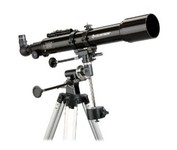
Celestron’s PowerSeekers include a full range of eyepieces plus a 3x Barlow lens that provides an increase in viewing power hundreds of times greater than that of the unaided eye!
Manufacturer:Celestron Product MPN MPN | 21037 | Key Features Optical Design | Refractor | Optical Diameter | 70 mm | Finderscope | Optical | Focal Length | 700 mm | Max Useful Magnification | x 35 | Mount Type | Equatorial | Motorized | No | Miscellaneous UPC | 50234210379 |
Tags:celestron, powerseeker, 70, eq, 21037, 35, x, 70mm, telescope,
|
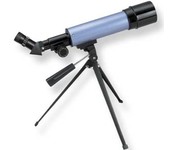
The Carson(tm) Optical SkyView(tm) 70-mm refractor telescope is designed to be rugged, trouble-free and easy-to-operated for the beginning observer. It features a focal length of 350 mm, a 45-degree diagnol, a power range of 14X to 87X, and an adjustable
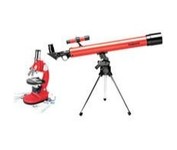
A classic, hand-held telescope with a gleaming brass finish and leatherette trim. Extends from 5.25" to 14" and includes an attractive leatherette carry case with wrist strap and belt loop.
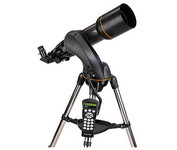
The popularity of our previous short tube refractor models inspired us to go a step further with the introduction of our NexStar 102 SLT. You'll find that astronomical viewing is a delight with this large, powerful 4 telescope.
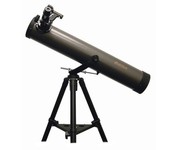
The Galileo FS-80 reflector telescope is a great beginner's reflecting telescope. The large 80mm primary mirror cell collects 33% more light than a 60mm refracting telescope. 1.25 focus housing permits the use of larger higher quality 1.25 eyepieces. Yoke mount makes the telescope easy to manage through altitude / azimuth (Up & Down, Left & Right) movement, and altitude slow motion control rod for precision adjustmentsMinimize






